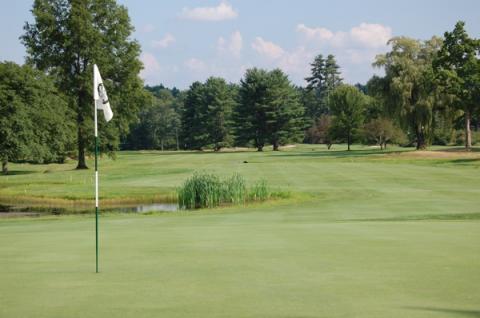
The second shot at the par 5 18th at Hop Meadow must steer clear of a stream down the left hand side and, for the approach, a pond in front.
My friend Bill and I played golf today at Hop Meadow Country Club in Simsbury, CT. The course was in great condition, it was a beautiful bracing fall New England day, and we managed to avoid throwing too many verbal punches at each other about Presidential politics (he's for one candidate, I am for the other). I am on a leave of absence from the club, where I have been a member for more than 20 years and have until February to decide whether to return. In recent years, with summer travel and other commitments, my family and I had not gotten enough use out of the club to justify the expense of dues and a modest assessment for clubhouse renovations a few years ago.
It is going to be a tough decision, although with the stock market and nation's financial system in crisis
Like me, Bill is a leading edge baby boomer bemoaning the fact that he has lost a few miles per hour on his clubhead speed (I know the feeling). In the course of conversation, he told me a dozen of his fellow club members had traveled to Ireland for a week of golf this summer. "They played 36 holes a day," he said, with some amazement. "I couldn't do that." I agreed, having struggled through some 18-hole days in Scotland this June on courses where pull carts were the only means of conveyance available.
Bill, who along with his wife Janet recently bought a second home in The Landings near Savannah (six golf courses on property), wants to keep walking the golf courses he plays as he ages but is mindful that 18 holes may become a bit of a struggle at some point. "If I were developing a golf course," he mused out loud, "I'd hire Nicklaus or Dye to put in just 12 holes."
We discussed it a little more and came to the conclusion that, for convention's sake, an 18-hole course made more sense but with the 6th and 12th holes coming back to the clubhouse. In that way, the super seniors could walk six holes and either quit for the day or take a cart for the rest. Others could walk the 12 holes or, if they were feeling especially spunky, walk all 18.
On a golf course on a beautiful New England day, many things seem possible.























